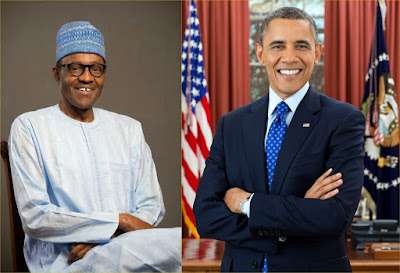PRESIDENT Muhammadu Buhari is visiting the United States of America, courtesy an invitation from that country’s President, Barrack Obama.
It’s widely known that the relationship between the two nations has for the past two years or more been strained.
Buhari’s Media and Publicity Adviser, Femi Adesina, has highlighted that the Nigerian president’s priorities are on how to strengthen and intensify bilateral and international cooperation against terrorism in Nigeria and West Africa.
President Buhari would also be seeking America’s support for his administration’s war against corruption as well as fresh measures to boost trade relations between the two countries.
Beyond photo-ops, Nigerians expect that this trip should be one that delivers enduring results.
These are 10 of the questions Nigerians are asking – and which Nigerian and American officials must not gloss over as they interact during this visit for America to show that Nigeria – Africa’s largest democracy and the world’s sixth largest democracy – is worth more than a dime in its books.
Why, indeed, did President Barrack Obama simply not include a visit to Nigeria in his trip to Africa rather than inviting President Buhari to America?
Former President Goodluck Jonathan had in 2010 also visited the United States of America on the invitation of President Barrack Obama. But, nothing much changed thereafter in the two nations’ relationship. Is this history repeating itself?
Will President Barack Obama use this trip to state clearly what his Administration’s policy priorities for Nigeria are?
Obama has consistently shown that America’s is determined to “degrade and ultimately destroy the terrorist group ISIL (by) harnessing all elements of American power, across our government — military, intelligence, diplomatic, economic, development and perhaps most importantly, the power of our values” but it would seem that the United States and its allies have made only vows but no action in the fight against Boko Haram. Will Obama use this visit to roll out not only a comprehensive strategy but also an action plan to end the rising insurgency in Nigeria’s north east?
Recently President Obama said America with “take direct action against terrorists (and) continue to also partner with nations from Afghanistan to Nigeria to build up their security forces. We’re going to work day and night with allies and partners to disrupt terrorist networks and thwart attacks, and to smother nascent ISIL cells that may be trying to develop in other parts of the world.” Will he use the opportunity of this visit by to outline a Timeline. Action should speak more than words.
The United States reportedly refused – and even blocked other nations which were willing – to sell military equipment to Nigeria. What will change, now that a new administration headed by a man with impeccable anti-corruption records and who has demonstrated uncommon resolve to end insurgency in Nigeria, is in charge?
Secretary of State John Kerry had also “pledged support for the continuing efforts by African nations to find the (Chibok) girls.” America has undoubtedly reneged on its pledge to offer all possible military assistance to bring the girls back? What will change now?
On 6 April 2010, America and Nigeria signed the US-Nigeria Bi-national Commission “to strengthen and deepen the partnership” between the two countries. Specifically, the Commission was aimed, among others to ensure “broader collaboration on security and counter-terrorism”, closer working relationship on energy reform and investment and stronger focus on food security and agricultural development. Will this visit be an opportunity to revive this Commission as it seems it is in limbo?
How can President Obama make his Power Africa initiative more result-orientated in Nigeria?
How is America going to help Nigeria fight corruption particularly where it concerns American companies which have colluded with Nigerians to launder money?
